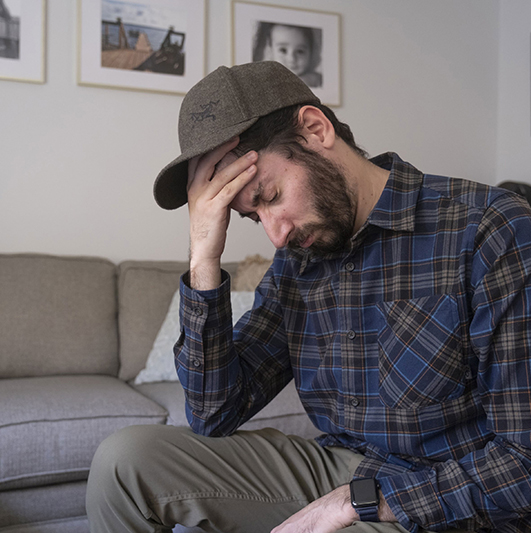Can High Blood Pressure Cause Headaches?

September 26, 2024
High blood pressure may increase the risk of heart attack, stroke and kidney disease. But most people with high blood pressure don’t know that they have it.
High blood pressure, also known as hypertension, usually has no noticeable symptoms. Although it isn’t common, some people do experience symptoms.
Common symptoms of hypertension include:
- Headaches
- Chest pain
- Vision changes
It’s better to learn that you have hypertension before you notice signs of the condition. They often arise when the condition has been present a long time.
“I don’t want people to wait for symptoms,” says Baback Adibi, M.D., a Hackensack Meridian Health cardiologist in Teaneck, New Jersey.
What Blood Pressure Levels Mean
At well visits, doctors use an arm cuff to measure blood pressure.
“Blood pressure is one of the vital signs, along with temperature, pulse and respiratory rate,” Dr. Adibi says. “It tells you what’s going on with the patient.”
Blood pressure readings have two numbers: The top number is systolic and the bottom is diastolic.
“Systolic is the pressure in your arteries when your heart is beating, and diastolic is the pressure in your arteries when the heart is relaxed, and filling with blood,” Dr. Adibi says.
Blood pressure readings show whether someone’s blood pressure is normal or high:
- Normal blood pressure: Systolic is less than 120 mm Hg, diastolic is less than 80 mm Hg.
- Elevated blood pressure: Systolic is 120-129 mm Hg, diastolic is less than 80 mm Hg.
- Stage 1 high blood pressure: Systolic is 130-139 mm Hg, diastolic is 80-89 mm Hg.
- Stage 2 high blood pressure: Systolic is 140 mm Hg or higher, diastolic is 90 mm Hg or higher.
Different external factors may cause someone’s blood pressure to rise. Common possibilities include:
- Eating food that’s high in salt
- Forgetting to take blood pressure medication
- Getting angry
- Experiencing stress or pain
Headaches May Be a Sign of High Blood Pressure
It isn’t common for hypertension to cause headaches. Sometimes, they arise when there’s a change in blood pressure in patients with hypertension.
“If they happen to have a spike in the blood pressure, one way they might know is that they have a headache,” Dr. Adibi says. “If they stray from their diet and have Chinese food or something else loaded in salt, they might feel it.”
Once blood pressure levels return to normal, the headache should fade.
Chest Pain May Be a Sign of High Blood Pressure
When blood pressure rises suddenly, it may put stress on the heart. If this happens, some people with hypertension may experience chest pain.
“The patient can feel like they’re having angina, or chest pain, if it’s very high blood pressure,” Dr. Adibi says. “It could be anything that causes their blood pressure to rise.”
Some people experience mild pain, while others may wonder if it’s a heart attack. If you think that you’re experiencing a heart attack, call 911 for help.
Chest pain caused by blood pressure spikes should pass when normal levels resume.
Vision Changes May Be a Sign of High Blood Pressure
It’s unlikely for people to experience vision changes because of high blood pressure. However, some people with undiagnosed, untreated hypertension develop visual disturbances over time.
Untreated high blood pressure may damage the tiny, delicate blood vessels in the eyes. Some people may have trouble seeing clearly, while others may lose their vision.
“Any visual changes, like blurry vision or darkening of the vision, could be caused by uncontrolled high blood pressure,” Dr. Adibi.
For some people, controlling blood pressure levels may help to restore vision.
Treatments for High Blood Pressure
Lifestyle changes and medication are both options for people with high blood pressure.
When doctors prescribe medication, patients don’t always want to take it.
“If you lost vision in your eye every time your blood pressure went up, you’d take medicine for that,” Dr. Adibi says. “When you don’t feel anything, it’s hard to get someone to comply.”
Some people are motivated to make lifestyle changes to manage hypertension, such as:
- Eating a low-salt diet with healthy whole foods
- Getting 150 minutes of moderate-intensity exercise (like walking) every week
- Maintaining a healthy weight, which may mean losing some weight
“There’s actually people who are on blood pressure medicine that lose weight and can come off blood pressure medicine,” Dr. Adibi says.
Next Steps & Resources:
Meet our source: Baback Adibi, M.D.
To make an appointment with Dr. Adibi or a doctor near you, call 800-822-8905 or visit our website.
The material provided through HealthU is intended to be used as general information only and should not replace the advice of your physician. Always consult your physician for individual care.






